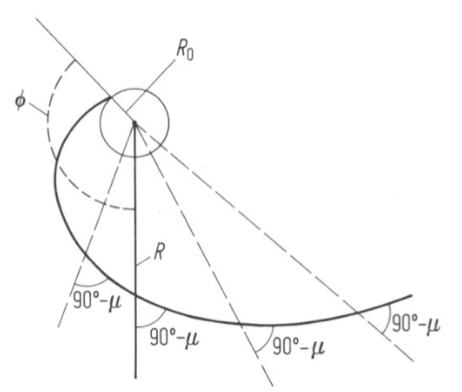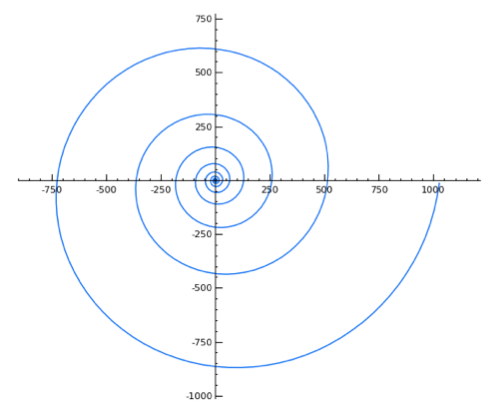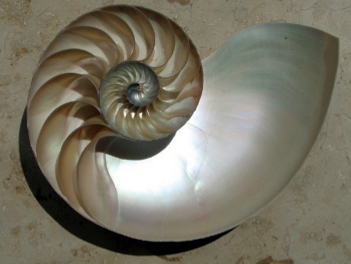
In honor of Pi Day…
 The first time I experienced the deep connection between math and physical reality was in performing a high school chemistry experiment to discover whether the antacid Rolaids really did consume 47 times its weight in excess acid. The experiment involved very precise weighing and an acid-base titration. I grew up in a small rural town on Maryland’s Eastern Shore, but there was a small NASA facility on the coast about twenty miles away, and since many parents worked there—including my father—my school often borrowed state-of-the-art equipment. Our little chem lab had a high speed centrifuge, a sensitive electronic scale with an evacuation chamber—the scale was so accurate it could weigh the air inside the chamber—and elaborate titration equipment. We also had—wonder of wonders for that time—an electronic desk calculator that was about the same size and twice the thickness of an iPad.
The first time I experienced the deep connection between math and physical reality was in performing a high school chemistry experiment to discover whether the antacid Rolaids really did consume 47 times its weight in excess acid. The experiment involved very precise weighing and an acid-base titration. I grew up in a small rural town on Maryland’s Eastern Shore, but there was a small NASA facility on the coast about twenty miles away, and since many parents worked there—including my father—my school often borrowed state-of-the-art equipment. Our little chem lab had a high speed centrifuge, a sensitive electronic scale with an evacuation chamber—the scale was so accurate it could weigh the air inside the chamber—and elaborate titration equipment. We also had—wonder of wonders for that time—an electronic desk calculator that was about the same size and twice the thickness of an iPad.
By the time I had finished the experimental procedures and recorded the data there was already a line at the calculator. So I performed the long string of calculations with pencil and paper. It was not complicated math; arithmetic and basic algebra were all I needed, but the significant figures for the data numbers went to three decimal places. The calculations, with all the side arithmetic and double-checking, filled my sheet of notebook paper. When I arrived at the bottom of the page, my answer, rounded to 46.9, seemed a bit lucky, so I went back over everything. The result was the same. I was surprised at the genuine link between my set of calculations and a little round antacid tablet. Numbers and equations in my head had reached out and touched something tangible.
 I would like to say that right then and there I had an epiphany and saw God in the equations, but that’s not what happened. It did make a lasting impression, even though my math skills never advanced beyond high school. I got algebra and geometry, but trigonometry was a bit elusive, and calculus completely escaped me. Yet my captivation by mathematics has only deepened over the years. I contemplate higher mathematics like a very average young man might gaze at a supermodel—beautiful to behold yet beyond his grasp; but maybe with a little extra effort…
I would like to say that right then and there I had an epiphany and saw God in the equations, but that’s not what happened. It did make a lasting impression, even though my math skills never advanced beyond high school. I got algebra and geometry, but trigonometry was a bit elusive, and calculus completely escaped me. Yet my captivation by mathematics has only deepened over the years. I contemplate higher mathematics like a very average young man might gaze at a supermodel—beautiful to behold yet beyond his grasp; but maybe with a little extra effort…
The Hungarian mathematician, Eugene Wigner, wrote an article in 1960, “The Unreasonable Effectiveness of Mathematics in the Natural Sciences,” in which he marvels at the uncanny ability of pure mathematical systems, developed with no practical applications in mind, to later be used to accurately express and predict natural phenomena in wide-ranging scientific theories, including Newton’s law of gravitation and 20th century quantum mechanical theory. He argued that “the enormous usefulness of mathematics in the natural sciences is something bordering on the mysterious and…there is no rational explanation for it.” Wigner was a Formalist—he believed that mathematics was strictly a human invention, and so we should have no expectation that something merely a product of the human mind would have any connection to external, physical reality. But mathematics clearly does have such a connection, and Wigner could only conclude: “The miracle of the appropriateness of the language of mathematics for the formulation of the laws of physics is a wonderful gift which we neither understand nor deserve. We should be grateful for it…” But Wigner, an atheist, could only have been metaphorical. From where such a “miracle” or “gift” would have come or to whom we should be “grateful” he does not explain.
In the ethereal world of pure mathematics, the opposition party to the Formalists, who say mathematics is strictly a human invention, are the Platonists, who say mathematics is a discovery and that it has real existence apart from the human mind. Just where and how the numbers and equations exist outside human consciousness are seldom made clear, and as many Platonists are materialists and atheists as Formalists.
 Mario Livio, in his book Is God a Mathematician?, takes a mediating position and says that mathematics is both invention and discovery. Mathematics, he offers, has its origin in the evolution of the human brain. Our ability to form mental mathematical models of external reality is a survival adaptation that nature has selected for. But that just strikes me as odd. Of what practical use for the physical survival and reproduction of the “fittest” is knowing the law of gravity or quantum mechanical theory? Even Wigner shoves this evolutionary explanation aside when he says, “Certainly it is hard to believe that our reasoning power was brought, by Darwin’s process of natural selection, to the perfection it seems to possess.”
Mario Livio, in his book Is God a Mathematician?, takes a mediating position and says that mathematics is both invention and discovery. Mathematics, he offers, has its origin in the evolution of the human brain. Our ability to form mental mathematical models of external reality is a survival adaptation that nature has selected for. But that just strikes me as odd. Of what practical use for the physical survival and reproduction of the “fittest” is knowing the law of gravity or quantum mechanical theory? Even Wigner shoves this evolutionary explanation aside when he says, “Certainly it is hard to believe that our reasoning power was brought, by Darwin’s process of natural selection, to the perfection it seems to possess.”
The same sort of manufactured dilemma has been applied to the question of what “goodness” is. Is something good simply because God says so, which seems to make “goodness” arbitrary. Or does God call some things good because there is some standard of goodness independent of God, which seems to make God less than sovereign and ultimate. The dilemma is simply dissolved when we realize that goodness is an essential aspect of God’s nature and character as love. God is love, and he only ever acts out of love. Goodness is what conforms to the character of God.
Likewise, no dilemma about the origin of mathematics exists if we realize that God indeed is, among other things, a mathematician. There really is an underlying regularity to the processes of the natural world, which we can express and predict mathematically, because the natural world is a creation. And the creation reflects the orderly and rational mind of its Creator. The best explanation for why we—and not aardvarks, apes, or dolphins—can use mathematics to discern the underlying regularities and structure of creation is that we are made in our Creator’s image, and our minds participate, in a finite way, in the order and rationality of the infinite mind of God. God matches our minds to his mind and to his creation.
 God is also an artist, and mathematics is the under-sketch on which he paints the masterpiece of the physical universe. The formal beauty of mathematics may seem rigid and cold to some, but it is one real facet of a beautiful Mind. Math connects to the real world, and through that world connects to the Maker of heaven and earth. It is perfectly reasonable that it does so.
God is also an artist, and mathematics is the under-sketch on which he paints the masterpiece of the physical universe. The formal beauty of mathematics may seem rigid and cold to some, but it is one real facet of a beautiful Mind. Math connects to the real world, and through that world connects to the Maker of heaven and earth. It is perfectly reasonable that it does so.

COMMENTS
2 responses to “Numbers: The Perfectly Reasonable Effectiveness of Mathematics”
Leave a Reply













Lovely! As a mathematician of faith also interested in art, I endorse this message.
Thanks for the thumbs up, John!